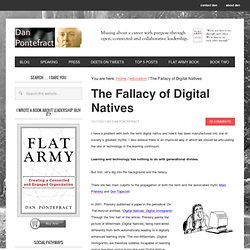

Jack and the Beanstalk- as told by a two year old. Daphne Koller - Technology as a Passport to Personalized Education. Clive Thompson on Why Kids Can't Search. Illustration: Tymn Armstrong We’re often told that young people tend to be the most tech-savvy among us.

But just how savvy are they? A group of researchers led by College of Charleston business professor Bing Pan tried to find out. Specifically, Pan wanted to know how skillful young folks are at online search. His team gathered a group of college students and asked them to look up the answers to a handful of questions. But Pan pulled a trick: He changed the order of the results for some students. Other studies have found the same thing: High school and college students may be “digital natives,” but they’re wretched at searching. Who’s to blame? Consider the efforts of Frances Harris, librarian at the magnet University Laboratory High School in Urbana, Illinois. But, crucially, she also trains students to assess the credibility of what they find online. “I see them start to get really paranoid,” Harris says.
In other words, Google makes broad-based knowledge more important, not less. On Digital Natives, Immigrants, Residents and Visitors - and implementing technology? Dave White wrote about his Digital Resident/Visitor model on the TALL blog back in 2008 ( and it has been well received. I have recently been thinking about the Digital Native/Immigrant idea of Prensky again, and finding a lot of the criticism of it to be focussed on a particular point, and somewhat lacking in critical reasoning, so I thought it about time I went back and looked at Dave White's model too.
It is established in the opening paragraph that Prensky's work is not seen as being useful because it "does not help guide the implementation of technologies it simply provides the excuse that “some people ‘just don’t get it’ which is why your new approach has failed so badly…”". That's OK, because there is no suggestion in Prensky's work ( that I have seen that suggests it was intended to guide implementation of technologies - it actually calls for a change of working practices amongst teachers to adapt and use the technologies to hand, those which are used by their students. A Collection of Digital Citizenship Resources. The natives are revolting. Slideshare. Digital Ethnography » Blog Archive » Subjects or Subjectivites? Royal Society journal archive made permanently free to access. 26 October 2011 Around 60,000 historical scientific papers are accessible via a fully searchable online archive, with papers published more than 70 years ago now becoming freely available.

The Royal Society is the world’s oldest scientific publisher, with the first edition of Philosophical Transactions of the Royal Society appearing in 1665. Henry Oldenburg – Secretary of the Royal Society and first Editor of the publication – ensured that it was “licensed by the council of the society, being first reviewed by some of the members of the same”, thus making it the first ever peer-reviewed journal. The open access debate. Slideshare. On Digital Natives, Immigrants, Residents and Visitors - and implementing technology? The Fallacy of Digital Natives. I have a problem with both the term digital native and how it has been manufactured into one of society’s greatest myths.

I also believe there is an improved way in which we should be articulating the use of technology in the learning continuum. Learning and technology has nothing to do with generational divides. But first, let’s dig into the background and the fallacy. There are two main culprits to the propagation of both the term and the associated myth; Marc Prensky and Don Tapscott. In 2001, Prensky published a paper in the periodical On The Horizon entitled, “Digital Natives, Digital Immigrants“. Hogwash. The second half of the article, however, has always been a solid piece of synthesis to me. Let’s turn our attention to my fellow Canadian, Don Tapscott. “Sure, you’re as cyber-sophisticated as the next person – you shop online, use Wikipedia, and do the BlackBerry prayer throughout the day. Balderdash. And now, we have credible research to back up my argument.
Their conclusion?